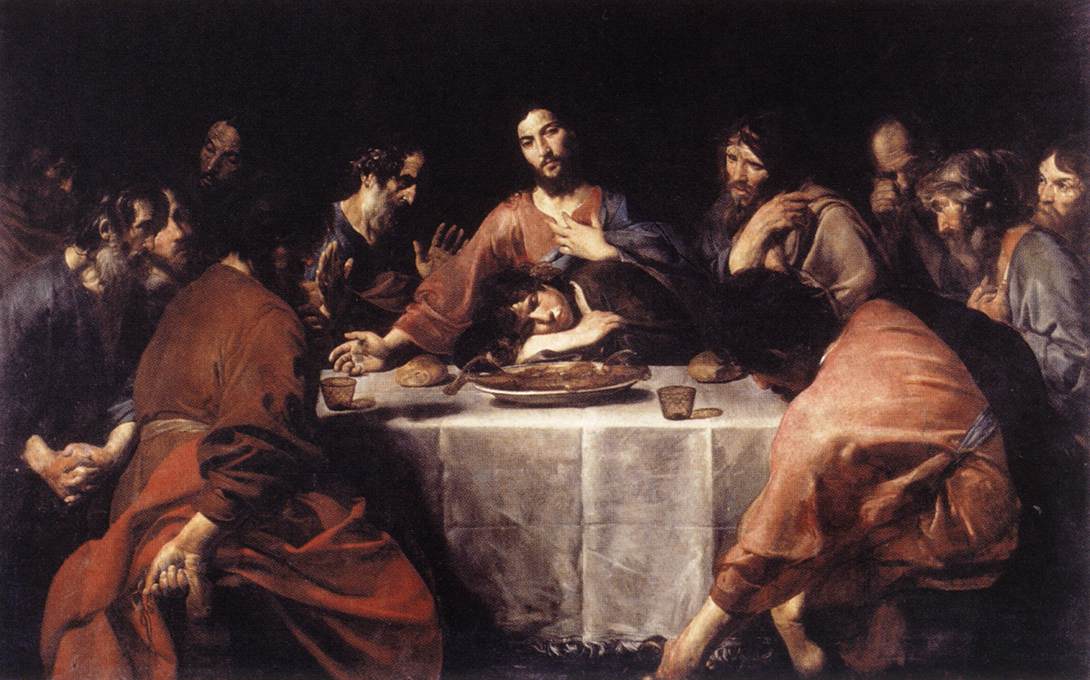
How would you like to be known as someone’s hope, joy, crown of exultation and glory? Last week we looked at Paul’s introductory words to the believers at Thessalonica, where he commended their work of faith, their labor of love and their steadfastness of hope. Now he heaps on these additional heart-warming accolades: hope, joy, crown of exultation and glory. We see a picture of a group of persons who, having accepted the Gospel message of Jesus Christ despite severe persecution, were so sold-out to their faith that they had become examples to believers wherever word of their faith had spread.
In today’s epistle reading, we get a further glimpse into what price the Thessalonians were paying to receive such praise. And there’s more to come. Paul lets us in on several things relating to his initial ministry among them and their response to it, words that fill in some of the blanks in the historical record that we find in Acts chapter 17. Paul had embarked on the second of his three missionary journeys, accompanied this time by Silas (also known as Silvanus) and his son in the faith, Timothy. They had set out more or less to visit and strengthen some of the churches Paul had established on his first missionary journey in what we call Asia Minor, or modern-day Turkey.
But God had a different plan, giving Paul what we call his “Macedonian vision.” In that vision Paul saw a man in Macedonia, north of Greece, imploring him to change his route and come instead to plant churches in that region. And so, in obedient response, Paul and his two companions headed off to Philippi, an important city in the northeast corner of Macedonia, where the opposition to which Paul refers in our reading was so strong that they ended up in jail. There they prayed and sang a hymnfest until an earthquake freed them from their chains and opened the prison doors, with the providential result that the jailer and his entire household came to faith.
From there they went to Thessalonica, the capital city of Macedonia, where they made converts from both the Jews and the Gentiles. But once again there was opposition from the Jewish leaders, with their host, Jason, being dragged before the city authorities and Paul, Silas and Timothy having to escape to Berea, where again there was a reprise of nearly the same scene. Finally, after ministry in Athens that included Paul’s famous address on Mars Hill known as the Areopagitica, they went on to Corinth, where Paul stayed for a year and a half and wrote both of his letters to the Thessalonians.
That’s the historical and geographical thumbnail sketch of how we got to this letter of Paul, praising the Thessalonians for their extraordinary response to the Gospel against fierce odds. It helps us to understand why Paul was so justifiably proud of them. And it also helps us to see why a major theme of this epistle is the Second Coming of Messiah, the return of Jesus Christ, a subject that is addressed at least briefly in all 5 chapters of I Thessalonians. These believers yearned with all their hearts for Christ’s return to end their persecution and to establish His eternal Kingdom.
As we’ve seen, the Thessalonian church, like most of Paul’s churches, had a mixed population. There were Jewish converts to whom Paul had first ministered for three Sabbaths after arriving in Thessalonica. We must remember that Paul described the Gospel, of which he was unashamed, as being “the power of God for salvation to the Jew first and then also to the Gentile” (Romans 1:16). There also were Gentile converts in Thessalonica who Paul says had “turned from idols to serve a living and true God.” He adds, significantly, that they all were now waiting for God’s Son to return from heaven, the One Whom God had raised from the dead, through Whom they were rescued “from the wrath to come.” Therein lies a lot of implied eschatology, that is, teaching about the end times, though for the moment Paul is content only to allude to it. Further development is deferred until the final two chapters, which we’ll study in the weeks to come. But in concluding chapter two Paul again refers to the Second Coming simply by saying that when it does occur, these Thessalonian believers will be his crown of exultation, his glory and joy.
Clearly the Resurrection, the Second Coming of Jesus and the Last Judgment all were taught by Paul during his rather brief ministry among the Thessalonians. Apparently Paul crammed a lot of catechesis into the weeks he was there, going beyond what we expect to hear today after years of attendance in our churches. The early Christians seem to have been eager to go deeper into the things that we now tend to relegate to theologians and seminarians. Paul told the believers in the church at Ephesus that he had “not hesitated to proclaim to them the whole counsel of God” (Acts 20:27). I imagine his sermons were rather longer than mine; but he made no apologies as long as he was convinced that he was indeed sharing with them “the whole counsel of God.”
There’s nothing in the Gospel message that we should discard as being too difficult or too challenging. Quite the contrary, we should treasure every morsel of divine truth that God has chosen to reveal to us. There are good reasons why we refer to this as “special revelation,” and we should consider ourselves to be the most privileged of all persons because God has chosen to reveal so much of His eternal truth to our finite minds.
There are a few other profoundly important things embedded in these verses that we shouldn’t miss. Paul places his own ministry to the Thessalonians not only in the context of persecution but also in terms of his divine commissioning, his having been “approved by God to be entrusted with the Gospel.” I’ve mentioned before that this very phrase is the motto of Trinity Evangelical Divinity School, where I did my first seminary studies: “approved by God to be entrusted with the Gospel.”
I want to expand on this just a bit this morning by way of personal testimony. One of the concerns expressed by members of the Commission on Ministry, when they were charged with either moving me forward for ordination or dismissing me from the entire process, was whether I viewed myself as transferring my leadership skills as a musician to my ministry as a priest in Christ’s one holy catholic and apostolic Church. If they had remained convinced that this was the case, they were poised to shut down the process at once. And they would have been right to have done so! But this was so far from my mind that I found the questions I kept being asked to be jarring and puzzling. Frankly, I’m absolutely certain that the Apostle Paul would have been just as disconcerted as I. Writing later on to the Corinthians, Paul asked, “Who is adequate for these things? For we are not like many, peddlers of the Word of God; rather from sincerity, as from God, we speak before God, in Christ” (II Corinthians 2:16b, 17).
Conducting Handel’s Messiah is one thing. Speaking about Messiah “from God, before God, in Christ” is something radically different. And the answer to Paul’s question is simple: no one is “adequate for these things.” Paul goes on to say, “we have our confidence toward God through Christ. Not that we are adequate in ourselves to consider anything as coming from ourselves, but our adequacy is from God, Who alone made us adequate as servants of the new covenant” (II Corinthians 2:4-6a, slightly paraphrased).
There you have it in a Pauline nutshell: God Himself overcomes our hopeless inadequacy by His grace so that, returning to I Thessalonians, we may be “approved by God to be entrusted with the Gospel. “So,” writes Paul, “we speak, not as pleasing men, but God, Who examines our hearts” (2:4). Only then, as Paul later wrote to his companion Timothy, can we “be diligent to present ourselves approved to God as workmen who do not need to be ashamed, accurately handling the Word of truth” (II Timothy 2:15).
Again, “our adequacy is from God,” or we must acknowledge ourselves to be woefully inadequate for these things. And when Paul says that he had not come to the Thessalonians with “flattering speech” or “with a pretext for greed” (2:5), he adds “God is our witness,” the “God who examines our hearts” (2:4). With God, there is no room for pretext or, as Paul writes in verse 3, for “error, impurity or deceit.”
What exactly was Paul’s message to these new converts in Thessalonica? Of course we don’t get a full transcript of his messages or even as full a summary as we get for some of the sermons recorded in the book of Acts. Sadly, none of Paul’s sermons was recorded or posted on the internet. But Paul gives us ample allusions to the content of his preaching. First of all he makes it clear that it was not about himself. He says in verse 6 that he was not seeking any “glory from men,” but that he was as gentle among them as a nursing mother tenderly caring for her own children. What a beautiful bit of imagery for how a pastor should relate to his flock! What a challenge for anyone who assumes that role! But Paul says that rather than puffing himself up to them, he simply shared “the Gospel of God,” the effect of which was to turn Gentiles away from their idols while also convincing some Jews that Jesus of Nazareth was their Messiah.
The Thessalonians seem to have been among those who were the most receptive and responsive to the Gospel message that Paul shared with them. And it’s for that very reason that Paul could lavish on them his beautiful words of praise. They had earned the right to be called Paul’s “hope, joy, crown of exultation and glory.” And in the process they had become “an example in every place that their faith toward God had gone forth” (1:7, 8), including to us at Grace Anglican Fellowship 2,000 years later.
May we learn to strive with all our might to be worthy of the Gospel with which we’ve been “approved by God to be entrusted.” Being entrusted with the Gospel is our extraordinary privilege. But it’s also our weighty responsibility, because it’s ours to share with others wherever we go, not to be kept to ourselves. Paul told Timothy to be ready to “preach the Word... in season and out of season” (II Timothy 4:2). Apparently there’s no season for not sharing the Gospel. We should take our stand with Paul as those who are not ashamed of the Gospel. Sharing it should be our primary task and our great joy.
May we be faithful to do that, to proclaim the Good News, always and only to the glory of God the Father and of the Son and of the Holy Spirit. Amen.




 RSS Feed
RSS Feed


